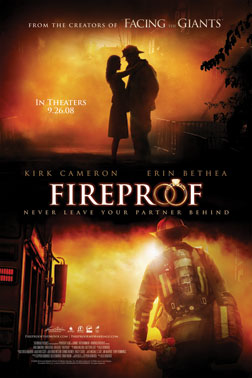
By Ronald E. Keener
Strong mainstream acceptance of faith-based movies creating an entirely new industry, says a film insider.
 The New York Times in early April headlined its review of the faith and family film, October Baby, as “Film Inspired by ‘Abortion Survivor’ is Quiet Hit.” Quiet indeed, a hit for sure, when it came out just two weeks earlier on only 390 screens and was No. 8 among movies – No. 1 of independent releases – in a weekend that included such big ones as The Hunger Games.
The New York Times in early April headlined its review of the faith and family film, October Baby, as “Film Inspired by ‘Abortion Survivor’ is Quiet Hit.” Quiet indeed, a hit for sure, when it came out just two weeks earlier on only 390 screens and was No. 8 among movies – No. 1 of independent releases – in a weekend that included such big ones as The Hunger Games.
On the weekend of April 13, it added 150 more screens, a fact that had a lot to say about the ability of moviegoers to deal with touchy subjects as abortion, and to see it from the view of faith and redemption.
What is less evident in the success of such Christian-themed films is the role that churchgoers and congregations have been playing with this movie and others like Facing the Giants, Fireproof, and Courageous — all Christian-oriented movies produced by Sherwood Pictures, a ministry of Sherwood Baptist Church in Albany, GA.
Using action squads
That role of churches is what is called “action squads,” which is a group that commits to purchasing 1,000 tickets in order to make sure the movie plays in their town. The promotion and distribution of films, especially those with Christian themes, have changed since the days of Mel Gibson’s Passion of the Christ, when the church community was involved in pushing that controversial film.
Kris Fuhr, vice president of theatrical marketing for Provident Films, which marketed October Baby to Christian audiences, explains how they go about reaching a broad audience. “We ask the group to work with their local theater to purchase 1,000 tickets for the opening weekend. Some groups are able to do this for $5.00 a ticket and sometimes they have to pay full price, depending on the theater. An action squad cannot use a ‘dollar theater,’ and the theater must have five or more screens.”
Fuhr says the squad leaders are usually lay leaders who get the support of the senior pastor, who might coordinate with a sermon series or a small group or Bible study on the same theme.
“We have a list of pastors we invite to the pre-screenings we sponsor,” says Fuhr. “Once a church commits to the 1,000 tickets, we allow them to pre-screen the movie to a maximum of 50 folks who need to be from other churches or groups within the community.” Churches are not permitted to pre-screen for their whole congregation.
Power of prayer
There is another “help” in the promotion of films – prayer. “Movies are a hard business, and we pray over everything: the idea, script, production and marketing. We ask God to open doors for us and to close doors that won’t be fruitful,” says Fuhr. “We pray for him to order our steps so that all might be to his glory not to ours.”
Fuhr finds that not all churchgoers want to go to a theater, and would rather view the film at the church. But she says such churches are missing a huge opportunity to reach people. “Many of the folks who most need to hear the message of Christ would hesitate to enter a church, but don’t think twice about going to the movies. You have to go where the people are, just as Christ did.”
For churches who are considering getting into the film business, Fuhr has this to say in the way of a caution: “It’s not for the faint of heart, and a season of prayer would be advised before undertaking such a project.”
Scott Mills of LifeWay Films says much the same thing, but is a bit more encouraging of congregations that want to enter story- telling through film. “I would tell them to go for it. It is a great ministry opportunity for your church. Be patient, find a great story, and involve as many people as you can from your church body.
“While production is important, don’t get too hung up on that. That will come as you do more and more of it. Who knows, you might have a kid in your youth group who is the next great film producer,” Mills says.
Marketing and licensing
LifeWay Films is a unit of LifeWay Christian Resources of the Southern Baptist Convention, the second largest denomination in the country, and began its division last October, working presently only in the areas of distribution and marketing, not production or financing of films. They began when they helped engage the church around the Sherwood Pictures film Courageous last year.
Mills describes LifeWay Films’ involvement as one of becoming a part of a film’s marketing team, and given the size of the denomination, that is a major marketing impact. “We also provide licenses to churches so they can legally show films at the church,” he says, and they have about 16 films they license or plan to do so.
“We are committed to providing quality films, not a quantity of films to the church,” he says. “We also create Bible studies with many films so that the impact of the film does not stop with the credits, but moves people from the film right into God’s word.”
 He believes the turning point for churches and the production of films came with Sherwood’s Fireproof (2006), but that “there were not many films to follow it in theaters, so we lost momentum. In 2011 there were five faith-based films in theaters: The Grace Card, Soul Surfer, Seven Days in Utopia, Tyler Perry’s Big Happy Family, and Courageous.” October Baby is leading a new group this year.
He believes the turning point for churches and the production of films came with Sherwood’s Fireproof (2006), but that “there were not many films to follow it in theaters, so we lost momentum. In 2011 there were five faith-based films in theaters: The Grace Card, Soul Surfer, Seven Days in Utopia, Tyler Perry’s Big Happy Family, and Courageous.” October Baby is leading a new group this year.
A growing opportunity
“I see momentum for Christian films and a growing opportunity as films get better. Many churches are still not engaging films because they do not want to invite people to a film that is not a good film,” Mills says. “Time will make the films produced better.”
“More and more people and churches are creating God-honoring content and our culture needs it. God is using these resources to teach people, as a tool to heal marriages, to challenge men to be godly men, and many other aspects.
“The body of Christ needs to support this movement. It is easy to be cynical when the movie does not match the quality of the big multimillion Hollywood block-busters, but we will get there,” he says.
LifeWay’s next film is called Unconditional, which is a story about forgiveness, healing from a loss, and getting out of one’s comfort zone to reach people. It is based on a real life story of Joe Bradford, a man in Nashville who has devoted his life to working with kids in the inner city.
Getting films with a Christian message, however well done and without religious polemics, can be a difficult task. Andy Erwin, who with his brother, Jon, made October Baby, said in an interview that major movie studies turned them down on the film. One Hollywood executive who is a believer and liked the story, turned him down because of the abortion topic.
Investors backed film
That’s why they produced the film independently. “We have several passionate pro-life Christian investors who put up the money for this film,” Erwin says, “and we’re determined to get it out to a nationwide audience.”
One of the film companies partnering with LifeWay films for public screenings and church exhibitions is Destiny Image Films in Shippensburg, PA. Looking at the current trend in faith and family films, most of them are done independent of major studios. Joel Nori, general counsel, says, “The new era of marketing today is really based on personal relationships and a reputation for providing top quality content that has a message, a purpose and support.”
Destiny has worked with three films in 18 months. If churches get into film production, there are some facts of life they need to keep in mind, says Nori. “A feature film has many different revenue streams that contribute to recouping the production and distribution expenditures that allow a film to break even and become profitable much faster than before. Screenings at churches are one of the revenue streams that must be planned for because it impacts several other revenue streams, such as DVD sales, digital sales and domestic licensing sales.
“Churches must consider production budget, distribution partner, filmmaking crew, a myriad of legal obstacles, funding sources, tax incentive programs, geographic locations for filming and how the location is impacted by the various tax incentives,” Nori says.
He sees not a market segment in faith and family, but “an entirely new industry,” similar to the birth of the Christian music industry in the 1980s. And the marketing of these films is changing too: “The days of spending a promotion and advertising budget for airing TV commercials, print ads and web advertising are ending. People follow people, people do not follow corporations,” Nori says.



Hi.I’m Humble To Present An Original Screenplay I Wrote To Raise Awareness To The Hardship Of Growing Up As Teenagers Of Diverse Background In Today’s Society , Focusing On Deeper Subjects That Are Overlooked In Mainstream Cinema! ( this is going to be first teenage movie without sex scene, drags, alcohol drinking. Clubbing. ) let’s help our teenagers which’s our future of our nation . God bless